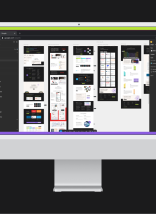The answer to this question really depends on what the purpose of your website is and what functionality is required. There are two primary approaches to web development and web design Raleigh: Using a website builder and developing a custom Raleigh web design. Continue reading for a breakdown between the two approaches and what might work best for you.
The best approach for your website depends on its purpose and the required functionality. There are two primary methods for web design and development, each with its own advantages and limitations: using a website builder or developing a custom website.
Using a Website Builder
Website builders have evolved significantly over the past decade, making them a viable option for many businesses and individuals. Initially, these tools offered basic designs, limited functionality, and were notoriously difficult to use. It was easy to identify a DIY-built site due to their clunky appearance and limited capabilities. However, recent advancements have made website builders much more sophisticated and user-friendly.
Advantages of Website Builders
Cost-Effective: Website builders are generally more affordable than hiring a web designer or developer. This makes them an attractive option for small businesses, startups, and individuals who need a professional online presence without a significant investment.
- Ease of Use: Modern website builders come with intuitive drag-and-drop interfaces, making it easy for users with little to no technical expertise to create and manage their sites.
- Quick Setup: With pre-designed templates and built-in functionalities, you can get a website up and running in a matter of hours or days, rather than weeks or months.
- Integrated Features: Many website builders offer a wide range of integrated features such as e-commerce capabilities, contact forms, forums, FAQs, blogs, and more. These features are often customizable and can meet the needs of most standard websites.
Limitations of Website Builders
- Customization Constraints: While website builders have become more flexible, they still have limitations in terms of customization. If you need a highly unique design or functionality that isn’t common, you might find these tools restrictive.
- Scalability Issues: As your business grows, you may find that a website builder cannot handle increased traffic or complex requirements. This can necessitate a migration to a more robust platform, which can be costly and time-consuming.
- SEO and Performance: Although many website builders are optimized for search engines, they may not offer the same level of SEO customization and performance tuning as a custom-built website.
Developing a Custom Website
For more complex needs and a higher degree of customization, developing a custom website is often the best approach. This method is ideal for larger businesses or those with specific requirements that cannot be met by standard website builders.
Advantages of Custom Websites
Tailored Design and Functionality: Custom websites are built to your exact specifications, ensuring that your brand, messaging, and functionality align perfectly with your business goals. This allows for a unique online presence that stands out from the competition.
- Scalability and Flexibility: Custom websites are designed to grow with your business. They can handle increased traffic, complex interactions, and unique functionalities, providing a more scalable solution for long-term growth.
- Advanced SEO and Performance: Custom websites can be optimized for search engines and performance to a greater extent than those built with website builders. This can lead to better search engine rankings and a smoother user experience.
- Integration Capabilities: Custom development allows for seamless integration with other systems and platforms, such as CRM software, payment gateways, and third-party APIs. This ensures that your website can support all your business operations efficiently.
Considerations for Custom Websites
- Higher Cost: Developing a custom website typically involves a higher upfront investment compared to using a website builder. This includes costs for design, development, testing, and ongoing maintenance.
- Longer Development Time: Custom websites take longer to develop due to the tailored design and functionality. The development process can span several weeks or months, depending on the complexity of the project.
- Ongoing Maintenance: Custom websites require regular updates, security patches, and maintenance to ensure they remain functional and secure. This necessitates a long-term commitment and potentially higher ongoing costs.
Conclusion
Choosing between a website builder and a custom website depends on your specific needs, budget, and long-term goals. Website builders are a great option for small businesses, startups, and individuals who need a professional and functional website quickly and affordably. On the other hand, custom websites are ideal for larger businesses or those with unique requirements, offering greater flexibility, scalability, and a tailored online presence. By carefully evaluating your needs and considering the advantages and limitations of each approach, you can make an informed decision that best supports your business objectives.




